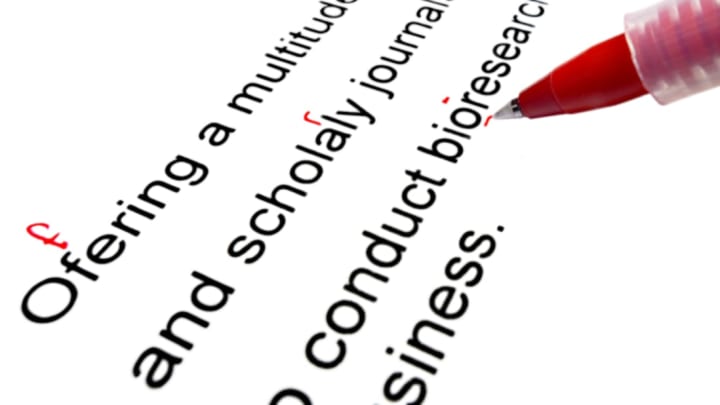English spelling can be frustrating and confusing, but there are things you can do to help make the task of getting it right more manageable. Here are some rules of thumb—and their exceptions—that you can use to conquer your spelling woes.
1. -IBLE OR -ABLE?
The word ending meaning “able to be” should sometimes be –able, as in acceptable and sometimes should be –ible as in invincible. Most of the time, if you’ve still got a full word when you strip the ending off (accept+able), you should go with –able. If you’re left with something that isn’t a full word (invinc+ible) go with –ible. Watch out for the small set of –ible words that do attach to full words (accessible, convertible, flexible) and for non-full word stems that end in a hard c or g sound. Those take –able (amicable, despicable, indefatigable, navigable).
2. TO DOUBLE THE CONSONANT OR NOT?
When adding –ed or –ing to a verb, sometimes you should double the final consonant (refer becomes referring) and sometime you shouldn’t (enter becomes entered). Generally, do not double the consonant unless you’ve got a one syllable word that ends with a single vowel followed by a single consonant (hit to hitting, stop to stopping) or a two syllable word that ends in same way and has stress on the second syllable (admit to admitted, begin to beginning). Some words are acceptable with or without the doubling, such as canceled/cancelled or traveled/travelled.
3. IE or EI
You may have heard the rule “i before e except after c.” This doesn’t work if the word has an “ay” vowel sound (as in weigh, neigh, sleigh), comes from the Latin root sci- (science, conscience, omniscient), is the plural of a word ending in –cy (mercies), doesn’t have an “ee” vowel sound (heir, their), or is just one of those words that doesn’t follow any of the rules (protein, weird, ancient, seize).
4. KEEP OR DROP THE E?
What do you do when you have to add a suffix to a word that ends in e? Keep it (grace+ful=graceful) or drop it (dance+ing=dancing)? Generally if the suffix begins with a consonant you keep the e and if it begins with a vowel you drop. However, if the final consonant sound is a soft c or g, you might keep the e with –able (noticeable, changeable) or –ous (outrageous).
5. CHANGE Y TO I
To make the plural of a word that ends in y, you must change the y+s to -ies, as in buddy/buddies, penny/pennies, or fry/fries. You don’t make that change, however, if the word is spelled with a vowel before the y (donkey/donkeys, Sunday/Sundays, toy/toys).
6. ADD S OR ES?
Add –es to make a plural if the word ends in sh (bushes), ch (churches), x (boxes), s (kisses), or z (waltzes). If the word ends in f, change it to v and add -es (half/halves, knife/knives). Otherwise, just add -s.
7. –IFY OR –EFY?
The –ify or –efy ending means “to make so.” Most of the time, the –ify version is correct (beautify, justify, purify). There are only a few words that take –efy, and you can just memorize them: liquefy, putrefy, rarefy, and stupefy.
8. CEDE, CEED, OR SEDE?
All you have to remember is that there is only one verb with this ending spelled as -sede (supersede). There are three spelled with -ceed (exceed, proceed, succeed) and the rest use -cede (intercede, concede, etc.).
9. POTATOES OR POTATOS?
The word for the single object is potato (not potatoe), but when you pluralize it you add an –es, making it potatoes. Words that end in a consonant followed by an o take the –es ending (echoes, heroes, tornadoes, volcanoes, buffaloes) but if they end in a vowel followed by an o they just take -s (patios, studios). The exceptions are musical terms (sopranos, solos, concertos), shortened words (photos, autos), and borrowed words (gauchos, tacos).
10. FOR OR FORE?
The prefix for- is used in fewer words than fore-. You can remember which one to use by paying attention to their different meanings. For- has the idea of prohibition or doing without (forbid, forgo, forget) while fore- has the idea of advance or “in front of” (foresight, forearm, forehead, foretell, foreword). While forgo is to do without, forego means to go in front (but is hardly ever used anymore, except in the expression “foregone conclusion”).
11. CH OR TCH?
If a word ends in a final “ch” sound, it may be spelled with a plain ch (reach) or a tch (watch). In general, if the “ch” sound follows a two vowel spelling, it should be a plain ch, and if it follows a one vowel spelling it should be tch. However, some very common words are exceptions to this (which, rich, much, such).
Armed with these handy spelling tricks, you just might be ready to take on the pint-sized geniuses on Lifetime’s Child Genius: Battle of the Brightest. Tune in to the season premiere Thursday, January 7th at 8/7c to see how your skills stack up.
